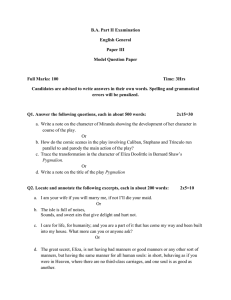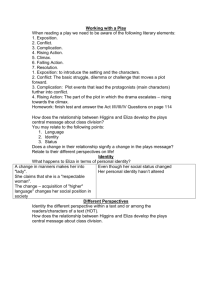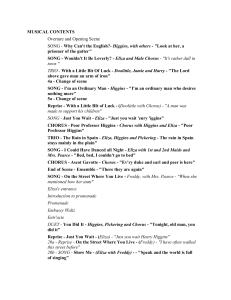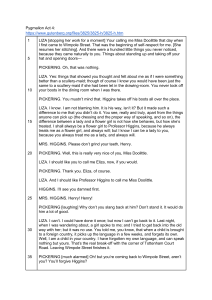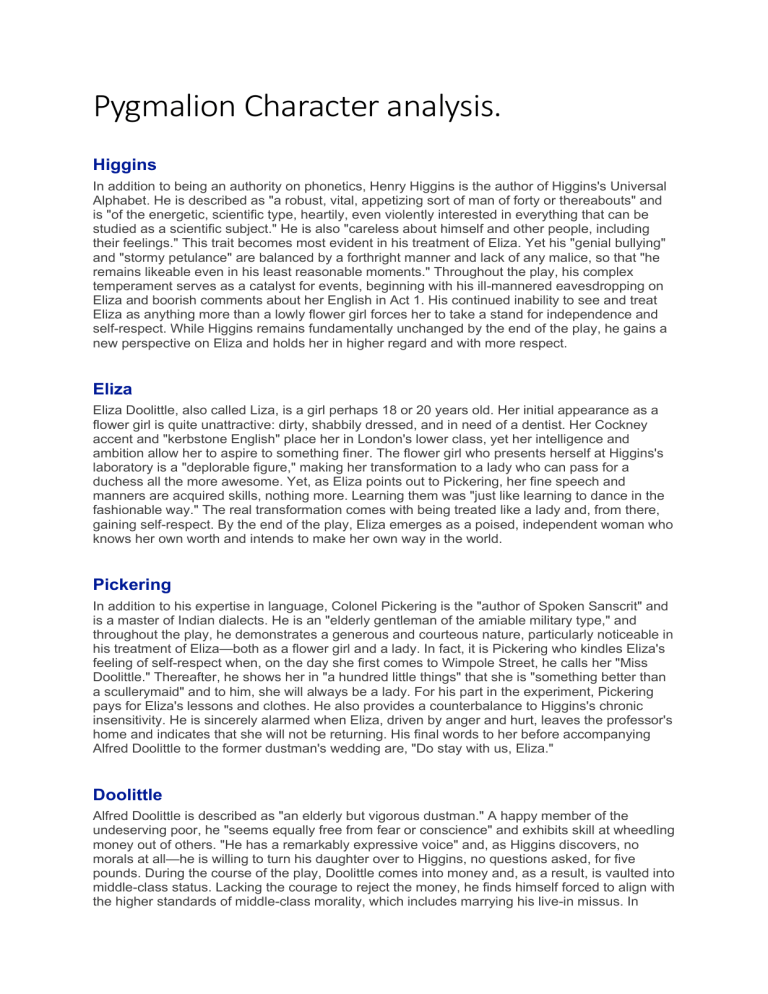
Pygmalion Character analysis. Higgins In addition to being an authority on phonetics, Henry Higgins is the author of Higgins's Universal Alphabet. He is described as "a robust, vital, appetizing sort of man of forty or thereabouts" and is "of the energetic, scientific type, heartily, even violently interested in everything that can be studied as a scientific subject." He is also "careless about himself and other people, including their feelings." This trait becomes most evident in his treatment of Eliza. Yet his "genial bullying" and "stormy petulance" are balanced by a forthright manner and lack of any malice, so that "he remains likeable even in his least reasonable moments." Throughout the play, his complex temperament serves as a catalyst for events, beginning with his ill-mannered eavesdropping on Eliza and boorish comments about her English in Act 1. His continued inability to see and treat Eliza as anything more than a lowly flower girl forces her to take a stand for independence and self-respect. While Higgins remains fundamentally unchanged by the end of the play, he gains a new perspective on Eliza and holds her in higher regard and with more respect. Eliza Eliza Doolittle, also called Liza, is a girl perhaps 18 or 20 years old. Her initial appearance as a flower girl is quite unattractive: dirty, shabbily dressed, and in need of a dentist. Her Cockney accent and "kerbstone English" place her in London's lower class, yet her intelligence and ambition allow her to aspire to something finer. The flower girl who presents herself at Higgins's laboratory is a "deplorable figure," making her transformation to a lady who can pass for a duchess all the more awesome. Yet, as Eliza points out to Pickering, her fine speech and manners are acquired skills, nothing more. Learning them was "just like learning to dance in the fashionable way." The real transformation comes with being treated like a lady and, from there, gaining self-respect. By the end of the play, Eliza emerges as a poised, independent woman who knows her own worth and intends to make her own way in the world. Pickering In addition to his expertise in language, Colonel Pickering is the "author of Spoken Sanscrit" and is a master of Indian dialects. He is an "elderly gentleman of the amiable military type," and throughout the play, he demonstrates a generous and courteous nature, particularly noticeable in his treatment of Eliza—both as a flower girl and a lady. In fact, it is Pickering who kindles Eliza's feeling of self-respect when, on the day she first comes to Wimpole Street, he calls her "Miss Doolittle." Thereafter, he shows her in "a hundred little things" that she is "something better than a scullerymaid" and to him, she will always be a lady. For his part in the experiment, Pickering pays for Eliza's lessons and clothes. He also provides a counterbalance to Higgins's chronic insensitivity. He is sincerely alarmed when Eliza, driven by anger and hurt, leaves the professor's home and indicates that she will not be returning. His final words to her before accompanying Alfred Doolittle to the former dustman's wedding are, "Do stay with us, Eliza." Doolittle Alfred Doolittle is described as "an elderly but vigorous dustman." A happy member of the undeserving poor, he "seems equally free from fear or conscience" and exhibits skill at wheedling money out of others. "He has a remarkably expressive voice" and, as Higgins discovers, no morals at all—he is willing to turn his daughter over to Higgins, no questions asked, for five pounds. During the course of the play, Doolittle comes into money and, as a result, is vaulted into middle-class status. Lacking the courage to reject the money, he finds himself forced to align with the higher standards of middle-class morality, which includes marrying his live-in missus. In misery he laments that "happier men than me will call for my dust ... and I'll look on helpless, and envy them." Mrs. Higgins Mrs. Higgins is a gracious member of the upper class. Her affection for Higgins does not shield her from irritation at his lack of manners, and she is adept at putting him in his place. Intelligent and perceptive, she soon discerns the problems that her son's experiment will cause for Eliza, and sympathizes with the girl. As the conflict between Eliza and Higgins erupts, it is to Mrs. Higgins that Eliza turns for help. Freddy Freddy is a young man of 20, a member of the upper class, good-natured though somewhat weak, and a true gentleman. He is infatuated with Eliza, writes to her daily, and is happiest just spending time on the street where she lives. At the end of the play, Eliza suggests that she might marry Freddy, though he has no money to support them both and seems unfit for work. But he is devoted to her, can offer the kindness that she needs, and, unlike Higgins, he won't try to make something out of her. Mrs. Pearce Mrs. Pearce has been Higgins's housekeeper for some time—long enough to know his singular ways and, without fear, to reproach him when needed for his lack of social graces. She has a strong sense of propriety, and takes it upon herself to be sure that Eliza is cared for properly while in the house. A bond between them grows, and Mrs. Pearce frequently pushes Higgins to show consideration for Eliza and to think about her future.
